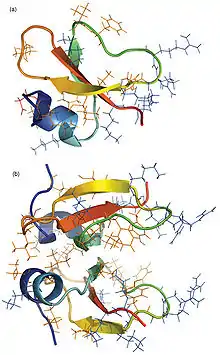Defensin
A defensin is a small cation protein found in animals and plants.[1][2] They are host defence peptides. They work against bacteria, fungi and many viruses.

Monomeric and dimeric structures of human beta-defensin HBD-2
Defensins have 18-45 amino acids including six to eight conserved cysteine residues.[3] Cells of the immune system have these peptides to help kill phagocytosed bacteria. Those cells include neutrophil granulocytes and almost all epithelial cells. Most defensins work by binding to the microbial cell membrane. Once there, they make tiny holes in the membrane which allow vital ions and nutrients to leak out.
Related pages
Notes
- Structure–activity studies of AtPep1, a plant peptide signal involved in the innate immune response Peptides Volume 29, Issue 12, December 2008, Pages 2083-2089
- Planta. 2002 Dec;216(2):193-202. Epub 2002 Oct 8. Plant defensins.
- "Conserved" means the sequence stays the same in almost all individuals in the population.
This article is issued from Wikipedia. The text is licensed under Creative Commons - Attribution - Sharealike. Additional terms may apply for the media files.